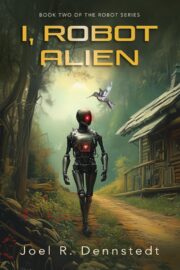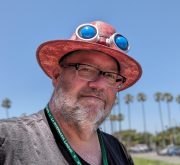Nebula Awards 2010 Interview: Jennifer Pelland
by Mercedes M. Yardley
 Jennifer Pelland lives outside Boston with an Andy, three cats, an impractical amount of books, and an ever-growing stash of belly dance gear. Her short story collection Unwelcome Bodies was published by Apex in 2008, and at the end of 2011, they’ll be putting out her debut novel, Machine.
Jennifer Pelland lives outside Boston with an Andy, three cats, an impractical amount of books, and an ever-growing stash of belly dance gear. Her short story collection Unwelcome Bodies was published by Apex in 2008, and at the end of 2011, they’ll be putting out her debut novel, Machine.
Your short story “Ghosts of New York” was just nominated for a Nebula award. Congratulations! Can you tell us a little about this piece and the process of writing it? Did you finish it and realize, “Hey, this has a shot at the Nebula”?
When I finished writing it, my first thought was actually, “Does this have a shot of being published?” The piece terrified me, and I feared it would actively offend editors. But despite that, I still felt compelled to write it. It was inspired by my second reading of Tom Junod’s article “The Falling Man,” which was published by Esquire Magazine. In it, he talks about the difficulty Americans have with remembering the jumpers, as evidenced by our reaction to the iconic “Falling Man” photograph taken by Richard Drew. The first time I read the article, it horrified me on a human level. The second time I read it, which was several years later, I’d gained enough distance to have it horrify me on an artistic level.
I came up with the story’s mythology about jumpers so I could shrink it to a more manageable size, and immediately came up with the connection to the Evelyn McHale suicide. Her photo is almost as iconic as the Falling Man’s. She jumped from the Empire State Building, and landed on the roof of a car with such force that it caved in. But her body was intact, her pose serene and beautiful. I ran across that photo as a child in a book of LIFE Magazine photos, and I haven’t been able to forget it since. The Triangle Factory was a natural addition after that, and I wedged in the General Slocum in honor of my good friend and mentor Michael Burstein, who wrote a Hugo-nominated time travel story about that disaster (“Time Ablaze”).
I can only imagine how difficult it was to place. Even though it’s a decade later, 9/11 is visceral subject matter. I’ll never forget watching the jumpers pinwheel from the building. What compelled you to write something that might get a negative knee-jerk reaction out of readers? Was it a struggle to find a home for “Ghosts of New York”?
I think I was compelled to write it because I had to try to make sense of what it would take to have jumping to my death seem like a good decision. I that as such an act of bravery. It was such an emphatic “fuck you” — a declaration that those people were going to chose the manner of their own death and not leave it in the hands of a small group of terrorists. I don’t think I could have been so strong.
As for my fears to the story’s reception… I definitely had them in spades, so I ran the story past two friends from New York to see if they thought it was offensive. Thankfully, they both encouraged me to start sending it out. I’ve since had a friend who lost a former lover in the North Tower that day tell me that the story is hard, but good and worthwhile. Her opinion means more to me than any other.
Not surprisingly, it wasn’t easy to find a home for this piece. I’m told that the slush readers at one of the big online markets were extremely enthusiastic about it when they handed it to the editor, who then immediately rejected it with a “too soon”. Apex Magazine actually rejected it for not having any science fiction content, but the editor, Jason Sizemore, quickly hooked me up with Maurice Broaddus who was editing Apex’s Dark Faith anthology. I think he bought it within 24 hours. Since then, I’ve sold it twice more to reprint markets, so it’s become one of my stories that keeps on giving.
You have a penchant for dark fiction with a thread of humanity running through it. Have you always written in this vein, or is that something that developed during time?
This definitely developed over time. I started out as a fanfic writer and wrote either silly stories or relationship stories. When I made the switch to writing in my own universes, the dark stuff took a while to come out, and once it did, it took a while for me to figure out how to make those stories publishable. Since I’m not good at plot, I went for characterization. I guess the thread of humanity comes from me trying to identify with my protagonists. It’s hard for me to write someone if I can’t get inside their head, and I don’t want to get inside someone’s head unless I can somehow empathize with them. Mind you, I still write silly stuff from time to time, just to confuse people.
This is your second Nebula nomination. “Captive Girl”, which was later included in your short story collection Unwelcome Bodies, was nominated in 2008. What is the nomination experience like the second time? How does it differ from the first?
Last time, I had a lot of complicated emotions around the nomination, and some pretty high expectations about what it meant for my career, none of which panned out. This time, I’m a lot more relaxed about it. I’m not bothering to go to the awards like I did last time. In fact, I’m having a party at my house and streaming the awards on my computer so I can watch Harlan Ellison or Adam-Troy Castro win from the comfort of my own home. In 2008, there was also a lot of bullshit flying about how too few people sent in nominations, so the works that made it to the final ballot weren’t really deserving of the honor. Plus people chalked up my nomination to the fact that William Sanders did a lot of campaigning for me. So I came away from the process feeling like I was a pretender who hadn’t deserved the honor. Getting nominated a second time lets me look back on that first nomination and no longer see it as a fluke.
It’s interesting that you would say that. I clearly remember the first time that I read “Captive Girl”. I set it down and took a deep breath. It was absolutely beautiful and unflinching. It’s such a strong piece.
Thank you!
Your artistic interests go beyond the literary. You’re also deeply involved in bellydancing, particularly tribal fusion. Do you mind explaining the differences between tribal fusion vs. the more traditional form of bellydance?
Let me see if I can keep this from turning into an essay. I think the first difference people notice is the costuming. Depending on the style of tribal someone’s dancing, it could either involve layers and layers of skirts and vests and woolen tassel belts and Afghani kuchi jewelry, or it could involve Ozma-esque headgear with halter tops and bellbottom pants and tons of scarves and belts around the hips, or it could even look straight out of a steampunk convention, or a goth nightclub, or both. There’s a lot of variety, but you won’t see the traditional sequins and beads.
Then, once the dancer starts moving, you’ll notice much more muscular arm and shoulder moves than traditional bellydance, plus a lot of popping and locking adapted from hip-hop dance. I enjoy tribal fusion because it gives you the freedom to experiment with other kinds of dance without having to be a virtuoso at any of those styles. I can’t do full-on hip-hop dance, but I can toss in a lock here and there and have it enrich my bellydance performance. I also do Improvisational Tribal Style, which is a semi-improvisational group dance, as part of an established duo. The nice thing about that style is that my partner and I can dance at the drop of a hat, provided we have a song with a 4/4 beat.
Do you feel that one art form enriches the other? Would your writing suffer if you didn’t bellydance, and vice versa?
To be honest, my writing has suffered thanks to bellydance. I have no regrets — I love the fact that I make art with my body and that I get immediate feedback at the moment of performance — but it does eat up the time and creative energy that I used to spend writing. I’m slowly trying to find ways to carve out writing time again without feeling like I’m neglecting my dance and leaving myself no time to relax. I also recently lost my father after a four month battle with cancer, which pretty much derailed my life for a while, so that’s another thing I’m struggling against as I try to get back into the habit of writing.
I’m sorry to hear about your father. I noticed that you started writing again soon after his loss, but that you felt you wouldn’t seek publication for this particular piece because it’s so very personal. Is it a conscious effort to write, or do you find that your art is a natural way to work though emotion?
It’s the former. Definitely. I’m putting a lot of what I went through as he was dying and after he died into the piece, not because I need to process it, but because I think I should get the thoughts and feelings on paper before they start fading. I’ve had grandparents and other elderly relatives die before, but it’s just not the same as losing a parent. The story is about that, and about what it’s like to be an atheist in a society that deals with death religiously, and what it’s like to get good news as your life is falling to pieces. I got the phone call about the Nebula nomination as it was becoming increasingly clear that my father wasn’t responding to chemo and radiation, and the day the news went public was the day they stopped treatment and put him into home hospice care. I’ve never experienced anything like that before — being on the receiving end of an outpouring out of public congratulations while being privately overwhelmed with grief. I never asked his permission to share his medical status online, so I couldn’t say anything publicly about it until he’d died. I wish there’d been a tactful way to tell people to keep their congratulations to themselves, because I just couldn’t enjoy them.
Anyhow, as you can tell, it’s still very immediate, so there’s no way I’ll be able to look at this story with objective eyes. Plus, I feel like I’d need to ask my family’s permission to try to publish it since it’s their story, too. Maybe after I set it aside for a while, I’ll be able to revise it into something worth sharing. But for now, that’s not part of the plan. Now, I just want to get to “The End”.
You mention in an earlier interview that you thought a Nebula nomination would make you feel like a success, but that feeling was fleeting. You also mentioned that putting out a novel might feel the same way and you might find a way to devalue your success. Do you think this is common of writers? Have you ever curled up at night with your cats and thought about what literary success means to you? Do you think that you’ll eventually feel that you’ve “made it”?
I honestly don’t know. I’d like to think that if I can someday have sustained success at selling to major markets, that I’ll feel like I’ve made it, but who can say? I think that part of the reason I let dance take over my creative energy was that I was able to go into it with lowered expectations. I knew that as an older woman with two blown-out knees and a really inflexible spine, I could only hope to attain the level of consistent mediocrity. That said, I know that I have my whole life to succeed as a writer, and much less time to succeed as a dancer before my body deteriorates to the point of uselessness, so I’m in no rush to try to race up the writing career hill right now.
That sounds like a healthy way to look at it, especially when there is so much pressure to keep rushing so as to build up a literary career as quickly as possible. So what is next for Jennifer Pelland?
My first novel comes out this summer. It’s called Machine, and it’s being published by my good friends at Apex. It’s a near-future story about a woman named Celia who develops early-onset Alzheimer’s. Since there’s no cure available, her mind is downloaded into a replacement body that’s indistinguishable from her flesh body, and her old body is put into stasis until the cure can be developed. But her wife can’t handle the thought of Celia being in two places at once, so she divorces her. Celia takes this badly (because if she didn’t, there’d be no story), and takes her grief out on her body, eventually falling in with a group of people who illegally hack their bioandroid replacement bodies to make them seem more mechanical and less human. It’s a pretty psychosexually fucked-up piece. In other words, it’s classic me. After that…I guess we’ll see. I’d like to write another novel, but I’m trying to take baby steps to get back into writing again so I don’t scare myself away from it.
It’s also a classic Pelland body modifying/destruction theme. I look forward to reading it. Thank you so much for agreeing to this interview, Jen. It was a pleasure.
Thank you! These were some great questions.
•••
 Mercedes M. Yardley wears red lipstick and poisonous flowers in her hair. An author of whimsical horror and nonfiction, she has been published in Hint Fiction, Werewolves and Shape Shifters: Encounters with the Beast Within, The Pedestal Magazine, and A Cup of Comfort for Parents of Children with Special Needs. Mercedes is the nonfiction editor of Shock Totem: Curious Tales of the Macabre and Twisted. Stop by her blog.
Mercedes M. Yardley wears red lipstick and poisonous flowers in her hair. An author of whimsical horror and nonfiction, she has been published in Hint Fiction, Werewolves and Shape Shifters: Encounters with the Beast Within, The Pedestal Magazine, and A Cup of Comfort for Parents of Children with Special Needs. Mercedes is the nonfiction editor of Shock Totem: Curious Tales of the Macabre and Twisted. Stop by her blog.


